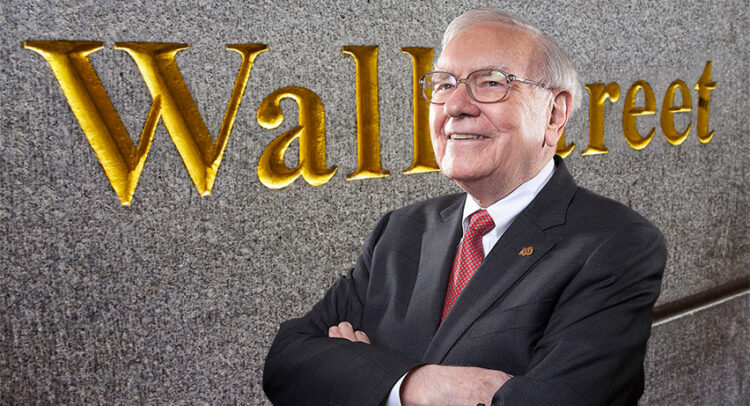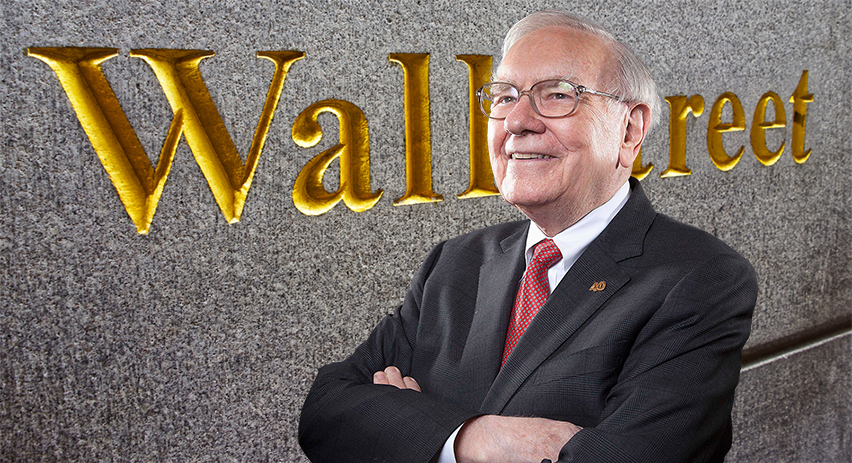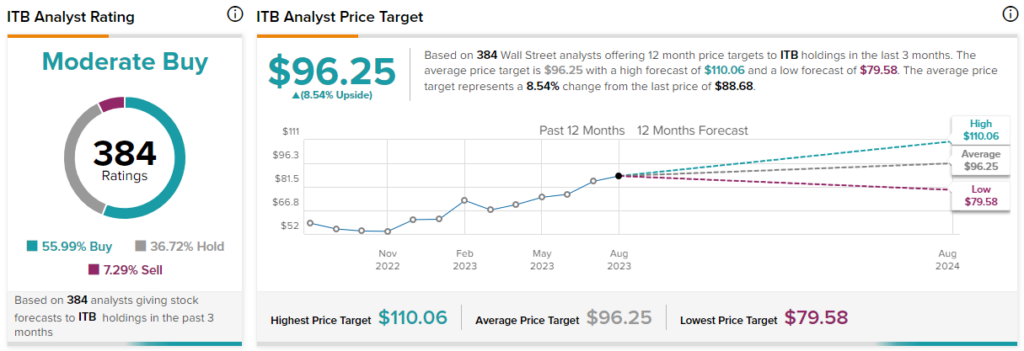Warren Buffett is widely recognized as the greatest investor of all time, so when he buys new stocks, investors tend to take notice. According to its latest 13F filing, which came out yesterday, Buffett’s Berkshire Hathaway initiated positions in just three new stocks during the second quarter — NVR (NYSE:NVR), Lennar (NYSE:LEN), and D.R. Horton, Inc. (NYSE:DHI). Interestingly, all three are homebuilders.
Discover the Best Stocks and Maximize Your Portfolio:
- See what stocks are receiving strong buy ratings from top-rated analysts.
- Filter, analyze, and streamline your search for investment opportunities with TipRanks’ Stock Screener.
While investors should always do their own due diligence before making any investment, taking inspiration from Buffett’s moves isn’t a bad idea, and luckily for investors who want to follow the Oracle of Omaha’s lead, there’s an ETF that owns large positions in all three of Berkshire Hathaway’s recently added positions — the iShares U.S. Home Construction ETF (BATS:ITB).
ITB is a $2.5 billion ETF from BlackRock’s iShares that gives investors, according to BlackRock, “exposure to U.S. companies that manufacture residential homes” by investing in “an index composed of U.S. equities in the home construction sector.” Let’s take a closer look at this home construction-focused ETF and why it’s an effective way to invest in Buffett’s new buys.
Why Homebuilders?
While the move has been a bit under the radar, homebuilders have actually posted a strong rally year-to-date — for example, ITB is up 44.4% year-to-date. We previously covered the move to the upside in homebuilder ETFs when the rally was starting to kick into full gear earlier this summer.
While these stocks have rallied off of their previous lows, the fact that all three of Berkshire’s new buys are homebuilders seems to indicate that Buffett and his portfolio managers have conviction in the idea and see value in the space as a whole.
Buffett is, first and foremost, a value investor, and despite the aforementioned rally, homebuilders (including the ones Buffett bought) still look like a bargain. For instance, D.R. Horton is valued at 13.2 times earnings, Lennar trades for 12.7 times earnings, and NVR has a price-to-earnings multiple of 13.7.
These leading homebuilders all trade at sizable discounts to the broader market — the S&P 500 currently has a price-to-earnings multiple of about 20. The ITB ETF itself is even cheaper than these individual stocks, with an average price-to-earnings ratio of 9.5.
Furthermore, many analysts and observers believe that there is a long-term shortage of new housing in the United States, so these homebuilders could have the wind at their backs over the long term as supply catches up with demand.
ITB’s Holdings
Not only does ITB own all three of Berkshire’s new buys, but they are also actually its three largest holdings, as you can see in the overview of ITB’s top 10 holdings below.
D.R. Horton is the fund’s top holding, with a weighting of 14.8%. Lennar is ITB’s second-largest position, with a 12.1% weighting, while NVR is its third-largest holding, with a weighting of 7.3%. Clearly, ITB gives investors significant exposure to the newest additions to Buffett’s portfolio, as these three new buys make up over a third of ITB’s assets.
Beyond these three Buffett buys, the fund also owns other prominent homebuilders, including its fourth-largest holding, Pultegroup, as well as Toll Brothers, Meritage Homes, and Taylor Morrison.
Additionally, the fund owns other companies that either serve or supply the homebuilding industry, such as paint maker Sherwin-Williams, home improvement juggernaut Home Depot, and building materials suppliers like Builders Firstsource and TopBuild.
ITB Vs. XHB ETF — Which Should You Choose to Follow Buffett?
Many readers may be familiar with another popular homebuilder ETF, the SPDR S&P Homebuilders ETF (NYSEARCA:XHB). So why should an investor looking to invest like Buffett choose ITB over XHB?
The answer is that while XHB owns Lennar, D.R. Horton, and NVR, it doesn’t give investors nearly as much exposure to these three stocks as ITB does. In fact, as you can see in the table below, none of these three names occupy a place within XHB’s top 10 holdings.
Within XHB, D.R. Horton has a weighting of just 3.7%, Lennar has a weighting of 3.7%, and NVR comes in at 3.6%.
These are both good ETFs, and this isn’t to say that ITB is a better ETF than XHB, but for readers looking to invest like Buffett, ITB is clearly the better option as it has much larger positions in his three new holdings.
Is ITB Stock a Buy, According to Analysts?
Turning to Wall Street, ITB has a Moderate Buy consensus rating, as 56% of analyst ratings are Buys, 36.7% are Holds, and 7.3% are Sells. At $96.25, the average ITB stock price target implies 8.54% upside potential.
Long-Term Performance
Homebuilding is known to be a cyclical industry, but looking at it over the years to smooth out the ups and downs, on average, ITB has posted some pretty solid returns. As of the end of the most recent quarter, ITB’s three-year annualized total return stood at a very impressive 25.4%. Using this same time frame, over the past five years, the ETF’s five-year annualized return is 18.3%, and over the past 10 years, it generated a 14.9% annualized total return.
These results mean that ITB has outperformed the broader market over the same time frame — as of the end of last quarter, the Vanguard S&P 500 ETF (NYSEARCA:VOO) had three-, five-, and 10-year annualized total returns of 14.6%, 12.3%, and 12.8%, respectively.
Additional Considerations
One minor downside of ITB that investors should take note of is that while it isn’t an overly-expensive ETF in terms of fees, it isn’t particularly cheap either, with an expense ratio of 0.40%. This means that an investor allocating $10,000 into ITB would pay $40 in fees in year one. Over the course of a decade, these fees add up, and the same investor would pay $505 in fees, assuming the expense ratio remains the same and that the fund returns 5% per annum.
It should be said that the expense ratio isn’t out of line with its nearest competitor, XHB, which charges an expense ratio of 0.35%.
On the plus side, ITB is a dividend payer, although its current yield is just 0.6%.
Bottom Line
The 13F filings that investment firms file with the SEC give investors a window into the portfolios and the trades of top investors like Buffett. Investors should always do their own research before making an investment, but learning about and following the moves of all-time great investors is a great starting point when it comes to generating new investment ideas.
It’s interesting that all three stocks that Buffett and his portfolio managers initiated positions in during the second quarter are the same types of businesses. Clearly, the team at Berkshire Hathaway likes what it sees in the homebuilder space, which features cheap valuations and potential long-term tailwinds. The ITB ETF gives investors the opportunity to gain significant exposure to this industry and all three of Buffett’s new stocks in one investment vehicle.












